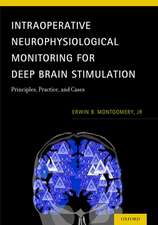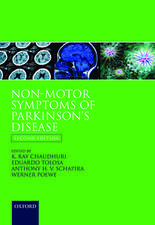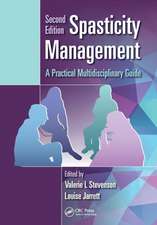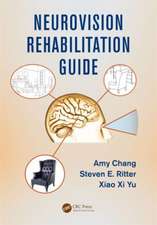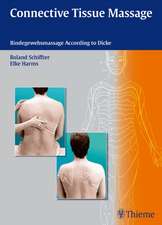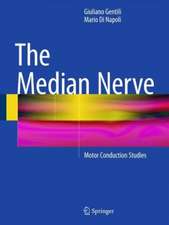Handbook of Neurosurgery, Neurology, and Spinal Medicine for Nurses and Advanced Practice Health Professionals
Editat de Michael Wang, Andrea Strayer, Odette Harris, Cathy Rosenberg, Praveen Mummanenien Limba Engleză Paperback – 20 dec 2017
| Toate formatele și edițiile | Preț | Express |
|---|---|---|
| Paperback (1) | 505.40 lei 3-5 săpt. | +54.64 lei 7-13 zile |
| Taylor & Francis – 20 dec 2017 | 505.40 lei 3-5 săpt. | +54.64 lei 7-13 zile |
| Hardback (1) | 1013.36 lei 6-8 săpt. | |
| Taylor & Francis – 20 dec 2017 | 1013.36 lei 6-8 săpt. |
Preț: 505.40 lei
Preț vechi: 531.99 lei
-5% Nou
Puncte Express: 758
Preț estimativ în valută:
96.71€ • 99.77$ • 80.70£
96.71€ • 99.77$ • 80.70£
Carte disponibilă
Livrare economică 05-19 martie
Livrare express 19-25 februarie pentru 64.63 lei
Preluare comenzi: 021 569.72.76
Specificații
ISBN-13: 9781498719421
ISBN-10: 1498719422
Pagini: 576
Ilustrații: 225
Dimensiuni: 189 x 246 x 37 mm
Greutate: 1.36 kg
Ediția:1
Editura: Taylor & Francis
Colecția Routledge
Locul publicării:Oxford, United Kingdom
ISBN-10: 1498719422
Pagini: 576
Ilustrații: 225
Dimensiuni: 189 x 246 x 37 mm
Greutate: 1.36 kg
Ediția:1
Editura: Taylor & Francis
Colecția Routledge
Locul publicării:Oxford, United Kingdom
Public țintă
Academic and Professional Practice & DevelopmentCuprins
Part I: Introduction.
1. The importance of neurological illnesses. emergencies. and treatments
2. Neurological decompensation and emergencies
3. The Neurointensive Care and Neuromonitoring Unit
4. The Neurosurgical Operating Room
5. Neurological Triage and the Differential Diagnosis
Part II: Anatomy.
6. Neuroanatomy overview Part I: Cranial
7. Neuroanatomy overview Part II: Spine
8. Neuroanatomy Overview Part III: Peripheral Nervous System
9. The neurological examination Part I: Cranial
10. The neurological examination Part II: Spine
11. The Neurological Examination Part III: Peripheral Nervous System
12. Lesion Localization
13. The neurological examination of the infant and child
Part III: The team approach.
14. Collaborative Practice with the Neurointensivist. Neurologist. and Neurosurgeon
15. Occupational. physical and speech therapies
16. Neuroanesthesia
17. Nutrition and Surgical Recovery
18. Social Services & Case Management
19. Coordinating and Preparing for the Transition from the Acute Care Setting
20. Adaptive Equipment
21. Short and Long Term Disability
22. Scientific Research & Clinical Trials
Part IV: Monitoring the patient.
23. Serial Neurologic Examinations
24. Intracranial Pressure Management
25. Electrophysiology
26. Monitoring the Patient: CSF Drainage
27. Spine Surgery Wound and Drain Management
28. Neurological Monitoring
29. The Post Anesthesia Care Unit (PACU) Environment and the Neurosurgical Patient
Part V: Clinical pathologies and scenarios: Brain.
30. Mild Traumatic Brain Injury
31. Severe Traumatic Brain Injury
32. Chronic Subdural Hematoma management
33. Acute Hemorrhagic Stroke
34. Clinical Pathologies and Scenarios: Subarachnoid Hemorrhage
35. Hydrocephalus
36. Malignant Brain Neoplasms and Brain Metastasis
37. Pituitary Surgery
38. Skull base tumors
39. Posterior Fossa Surgery
40. Epilepsy Surgery
41. Brain Abscess
42. Type I Chiari Malformations
43. Brain Death and Organ Donation
Part VI: Clinical pathologies and scenarios: Spine.
44. Spinal Cord Injuries and Fractures
45. Cauda Equina Syndrome
46. Acute Low Back Pain
47. Acute Neck Pain & Whiplash
48. Anterior cervical surgery
49. Posterior Cervical Surgery
50. Spinal Decompressive Surgeries and Lumbar Microdiscectomy
51. ELECTIVE SPINAL SURGERY FOR LUMBAR FUSION
52. Elective Spinal Surgery for Scoliosis & Kyphosis
53. Spinal Tumors
54. Postoperative Multimodal Oral Pain Management in the Spine Patient
55. Bracing and Electrical Stimulation
56. Postoperative Physical and Occupational Therapy
57. Community-Acquired Spinal Infections
58. Iatrogenic Spinal Infections
59. Clinical Pathologies and Scenarios: Spinal Fluid Leakage
60. Percutaneous Spinal Interventions & Pain Management
Part VII: Clinical pathologies and scenarios: Neurology.
61. Acute Ischemic Stroke
62. Delirium
63. Meningitis
64. Alzheimer's dementia
65. Parkinson Disease
66. Status Epilepticus
67. DEMYELINATING SYNDROME: Multiple Sclerosis
68. Intoxications
69. Headache
70. Peripheral Nerve Disorders
1. The importance of neurological illnesses. emergencies. and treatments
2. Neurological decompensation and emergencies
3. The Neurointensive Care and Neuromonitoring Unit
4. The Neurosurgical Operating Room
5. Neurological Triage and the Differential Diagnosis
Part II: Anatomy.
6. Neuroanatomy overview Part I: Cranial
7. Neuroanatomy overview Part II: Spine
8. Neuroanatomy Overview Part III: Peripheral Nervous System
9. The neurological examination Part I: Cranial
10. The neurological examination Part II: Spine
11. The Neurological Examination Part III: Peripheral Nervous System
12. Lesion Localization
13. The neurological examination of the infant and child
Part III: The team approach.
14. Collaborative Practice with the Neurointensivist. Neurologist. and Neurosurgeon
15. Occupational. physical and speech therapies
16. Neuroanesthesia
17. Nutrition and Surgical Recovery
18. Social Services & Case Management
19. Coordinating and Preparing for the Transition from the Acute Care Setting
20. Adaptive Equipment
21. Short and Long Term Disability
22. Scientific Research & Clinical Trials
Part IV: Monitoring the patient.
23. Serial Neurologic Examinations
24. Intracranial Pressure Management
25. Electrophysiology
26. Monitoring the Patient: CSF Drainage
27. Spine Surgery Wound and Drain Management
28. Neurological Monitoring
29. The Post Anesthesia Care Unit (PACU) Environment and the Neurosurgical Patient
Part V: Clinical pathologies and scenarios: Brain.
30. Mild Traumatic Brain Injury
31. Severe Traumatic Brain Injury
32. Chronic Subdural Hematoma management
33. Acute Hemorrhagic Stroke
34. Clinical Pathologies and Scenarios: Subarachnoid Hemorrhage
35. Hydrocephalus
36. Malignant Brain Neoplasms and Brain Metastasis
37. Pituitary Surgery
38. Skull base tumors
39. Posterior Fossa Surgery
40. Epilepsy Surgery
41. Brain Abscess
42. Type I Chiari Malformations
43. Brain Death and Organ Donation
Part VI: Clinical pathologies and scenarios: Spine.
44. Spinal Cord Injuries and Fractures
45. Cauda Equina Syndrome
46. Acute Low Back Pain
47. Acute Neck Pain & Whiplash
48. Anterior cervical surgery
49. Posterior Cervical Surgery
50. Spinal Decompressive Surgeries and Lumbar Microdiscectomy
51. ELECTIVE SPINAL SURGERY FOR LUMBAR FUSION
52. Elective Spinal Surgery for Scoliosis & Kyphosis
53. Spinal Tumors
54. Postoperative Multimodal Oral Pain Management in the Spine Patient
55. Bracing and Electrical Stimulation
56. Postoperative Physical and Occupational Therapy
57. Community-Acquired Spinal Infections
58. Iatrogenic Spinal Infections
59. Clinical Pathologies and Scenarios: Spinal Fluid Leakage
60. Percutaneous Spinal Interventions & Pain Management
Part VII: Clinical pathologies and scenarios: Neurology.
61. Acute Ischemic Stroke
62. Delirium
63. Meningitis
64. Alzheimer's dementia
65. Parkinson Disease
66. Status Epilepticus
67. DEMYELINATING SYNDROME: Multiple Sclerosis
68. Intoxications
69. Headache
70. Peripheral Nerve Disorders
Descriere
This practical handbook allows nurses, physician assistants, and allied health professionals practicing in the fields of neurosurgery, neurology, and spinal care to quickly review essentials while in the work environment. It emphasizes procedural steps and critical elements in patient management. Written by a multidisciplinary team of experts.

